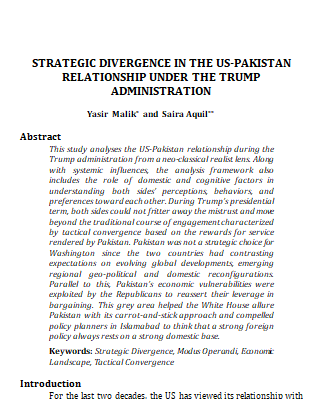STRATEGIC DIVERGENCE IN THE US-PAKISTAN RELATIONSHIP UNDER THE TRUMP ADMINISTRATION
DOI:
https://doi.org/10.54690/jcs.v11i2.232Keywords:
Strategic Divergence, Modus Operandi, Economic Landscape, Tactical ConvergenceAbstract
This study analyses the US-Pakistan relationship during the Trump administration from a neo-classical realist lens. Along with systemic influences, the analysis framework also includes the role of domestic and cognitive factors in understanding both sides’ perceptions, behaviors, and preferences toward each other. During Trump’s presidential term, both sides could not fritter away the mistrust and move beyond the traditional course of engagement characterized by tactical convergence based on the rewards for service rendered by Pakistan. Pakistan was not a strategic choice for Washington since the two countries had contrasting expectations on evolving global developments, emerging regional geo-political and domestic reconfigurations. Parallel to this, Pakistan’s economic
vulnerabilities were exploited by the Republicans to reassert their leverage in bargaining. This grey area helped the White House allure Pakistan with its carrot-and-stick approach and compelled policy planners in Islamabad to think that a strong foreign policy always rests on a strong domestic base.

Downloads
Published
How to Cite
Issue
Section
License
Copyright (c) 2023 National Defence University

This work is licensed under a Creative Commons Attribution-NonCommercial 4.0 International License.
License Terms








